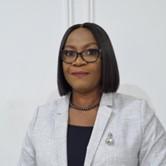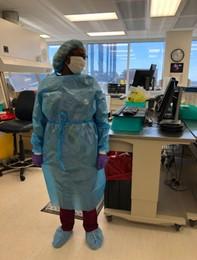Pharm. Clara Adesola FPCPharm (National Hospital Abuja)

It was a Thursday afternoon -our busiest day of the week- when Ms. A.B., a woman in her late 40s, walked into the pharmacy for a follow-up visit. She wore a brightly colored dress, beamed with a wide smile, and clutched a thank-you card. We had barely exchanged pleasantries when she embraced me tightly and said, “You didn’t just give me medicine, you gave me hope. You helped me fight a good fight and run the race to the finish.” as an oncology pharmacist in a Nigerian hospital.
Each morning, I wake up with a blend of determination and humility, fully aware of the critical role I play in the lives of patients battling cancer. This profession is more than a job—it’s a calling that demands patience, resilience, empathy, and unwavering compassion. My day begins at 8:30 am. After signing in, I head straight to the oncology pharmacy unit. I start by reviewing the day’s chemotherapy schedule—identifying the patients due for treatment, their diagnoses, and any recent lab results. I also participate in multidisciplinary team (MDT) meetings with oncologists, pathologists, laboratory scientists, nurses, and social health workers to discuss complex cases.
By 9:30 am, I’m fully suited in personal protective equipment (PPE), working in the cleanroom or designated compounding area. Preparing chemotherapy agents is a meticulous process involving multiple checks and strict documentation. In a resource-constrained setting like Nigeria, we often have to be innovative and extremely vigilant. Some medications are expensive and not always readily available, so I collaborate with physicians to suggest affordable or accessible alternatives without compromising therapeutic outcomes.
Thankfully, initiatives like the Nigeria Cancer Access Partnership (NCAP) and the Cancer Health Fund (CHF), supported by the Federal Ministry of Health, have significantly improved access to essential medicines, particularly for low-income patients. These programs, alongside contributions from health insurance schemes, are helping to bridge the gap in cancer care.

One of the most fulfilling aspects of my role is patient counseling. I speak with patients and caregivers, explaining their medications, how to manage side effects like nausea or fatigue, and emphasizing the importance of adherence to therapy. My role goes beyond dispensing medication; I provide reassurance, education, and support.
It was during one of these counseling sessions that I met Ms. A.B., the woman I mentioned earlier. She had been diagnosed with HER2-positive breast cancer. A schoolteacher and single mother of three, she was visibly anxious about chemotherapy and deeply troubled by the cost of treatment. I took time to walk her through her treatment plan, how to access the Cancer Health Fund, what side effects to expect, and how we would manage them together. She broke down in tears—not just from fear, but from the relief of being heard and understood. From that moment on, I followed her journey closely. She would stop by my office during each visit, sometimes just to chat or ask a few questions. Over time, she grew more confident, and even began encouraging other patients in the waiting area.
By afternoon, my focus shifts to documentation and inventory control. I verify stock levels, track the use and safe disposal of cytotoxic agents, and occasionally follow up with suppliers regarding delayed or unavailable medicines. I also supervise and mentor interns or junior pharmacists, ensuring they learn safe handling and compounding techniques under aseptic conditions.
The emotional weight of this work is very real. Some days we lose patients we've grown close to. Other times, we battle drug shortages or financial barriers that threaten to derail a patient’s treatment. But there are also moments of triumph—when a patient reports improvement, completes a treatment cycle, or simply stops by to say thank you. It was on one of these brighter days that Ms. A.B. returned, full of joy and gratitude, to share the news of her complete remission. Her words and warm embrace reminded me why we do what we do.
Amidst all the clinical responsibilities, we must also safeguard ourselves and others from prolonged exposure to hazardous drugs. While patients receive these agents over a defined treatment period, healthcare workers may be exposed—albeit in small doses—daily, over many years. This necessitates strict adherence to safety protocols to protect ourselves, our colleagues, and the community.
I usually wrap up my workday around 3:30 or 4:00 pm—physically drained but mentally fulfilled. Working as an oncology pharmacist in Nigeria is undoubtedly challenging, but it is deeply rewarding. Each day I walk into the pharmacy, I’m reminded that behind every prescription is a human life—and it’s my privilege to contribute to their management.